|
|
|
Sort Order |
|
|
|
Items / Page
|
|
|
|
|
|
|
| Srl | Item |
| 1 |
ID:
157780


|
|
|
|
|
| Summary/Abstract |
Many studies have looked into domestic violence but very few have considered women’s knowledge and perception about their rights. This study aims to examine the main sociocultural factors behind domestic violence against women with an emphasis on the power of the knowledge and perception of the women about their international and constitutional rights. Quantitative data collected in 2015 in the regions of East and Southwest Burkina Faso is used in this paper. Multivariate logistic regression is implemented to take into consideration the net effects of each factor when controlling the effects of other covariates. Results of this paper can be used to implement actions against domestic violence in the zone of intervention of the Program of Sexual Health and Human Rights project.
|
|
|
|
|
|
|
|
|
|
|
|
|
|
|
|
| 2 |
ID:
157773


|
|
|
|
|
| Summary/Abstract |
Municipal indigents’ are a category of poor citizens who qualify to receive certain municipal services for free in South Africa. Having registered as municipal indigents, the poor not only gain access to free basic services but also embark upon a voyage into a bureaucratic underworld where policies are changed and eligibility criteria and sanctions are unevenly applied. Various preconditions and limits on services, as well as social surveillance of indigent households, has turned indigency programmes into a ‘regime’. The policy has swung from hard cost recovery (mass disconnections) during the period 1994–2000 to ‘free’ basic services and, more recently, to social-shaming and criminalisation. This paper provides a thematic account of recent municipal indigent processes in order to explore the ‘moving boundary’ between benevolence and control regarding this crucial citizen–state interface. Based on recent interviews with government officials, a review of relevant government documents, and describing the administrative complexities, the paper reveals aspects of what the poor confront in day-to-day experiences of the state. It is argued that there are lessons for all municipalities seeking a more sustainable and democratic path to citizenship rather than an ongoing low-level war with poor citizens.
|
|
|
|
|
|
|
|
|
|
|
|
|
|
|
|
| 3 |
ID:
157779


|
|
|
|
|
| Summary/Abstract |
Recent scholarship on Ghana’s oil industry has focused primarily on its grand contributions to the national economy while its intra-city impact has received less academic attention. Borrowing from Terry Karl’s interpretation of the paradox of plenty, and drawing on empirical evidence from 25 purposefully selected interviewees, the study examines how the oil production off the shores of Sekondi-Takoradi is creating complex processes of accumulation, contradiction, and displacement in a low-income community—New Takoradi. The results point to the accentuation of socio-economic risks in the community following the inflow of oil revenue which is shaping government’s macro-level policies. The paper opines that without attention to place-specific contexts, understanding its socio-economic risks and decadence, and its semblance of strong resilience becomes deceptive. The paper concludes that context and situation are significant for how and to what degree the oil boom matters in the oil city.
|
|
|
|
|
|
|
|
|
|
|
|
|
|
|
|
| 4 |
ID:
157782
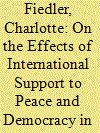

|
|
|
|
|
| Summary/Abstract |
This article shows that the international community can have a decisive impact on peace and democracy in a country, based on a paired comparison of Kenya and Kyrgyzstan. Both countries have experienced similar political trajectories, amongst them a struggle to consolidate peace and democracy after outbreaks of major interethnic violence, but show varying degrees of international influence on these processes. Analyzing several critical junctures in the two countries’ peace and democratization process through over 80 interviews reveals that although crucial international impact is rare, it is possible if donors jointly pursue a political agenda that connects to a home-grown process.
|
|
|
|
|
|
|
|
|
|
|
|
|
|
|
|
| 5 |
ID:
157776
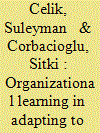

|
|
|
|
|
| Summary/Abstract |
Using a theoretical framework based on complex adaptive systems and organizational learning, the study compares and contrasts the network structures of two disaster response systems following the 2006 avian influenza crisis and the 2011 Van earthquake in Turkey. This study emphasizes the reorganization of Turkish disaster response in 2009 and its impact in response to 2011 Van earthquake. The research utilizes data from content analysis of news reports from the Turkish daily newspapers Cumhuriyet and Sabah from 28 December 2005 to 17 January 2006 for the avian influenza, and Hurriyet from 23 October 2011 to 8 November 2011 for the 2011 Van earthquake, respectively. The research has used social network analysis and small world ratio based on the content analysis data to compare and evaluate the network structures of the two response systems. Findings indicate that the Turkish disaster system, to some degree, learned from the previous disaster and was therefore better managed. However, the system still remained very centralized and multi-sectoral involvement is still weak.
|
|
|
|
|
|
|
|
|
|
|
|
|
|
|
|
| 6 |
ID:
157777
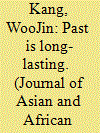

|
|
|
|
|
| Summary/Abstract |
The main goal of this study is to examine the political influence of Park Chung Hee (PCH) nostalgia on citizens’ support for Park Guen-hye (PGH) in the 2012 Korean presidential election. The 2012 presidential election offers a rare opportunity to test the political influence of PCH nostalgia on citizens’ electoral choices. To do so, this study analyzes dual aspects of PCH nostalgia and its influence on voters choosing PGH in the 2012 presidential election: voter preference for PGH, and voter identification with developmentalism, the PCH government’s dominant ideology. The findings of this study confirm that both aspects of PCH nostalgia significantly influenced citizens who chose to support Park Chung Hee’s daughter. These findings also have comparative implications, relevant to similar political situations in other emergent democracies.
|
|
|
|
|
|
|
|
|
|
|
|
|
|
|
|
| 7 |
ID:
157775


|
|
|
|
|
| Summary/Abstract |
Building on the theoretical proposition that congruence is as much a property to be measured in authoritarian regimes as it is in democratic regimes, the aim of this article is to understand the phenomenon of ideological and political congruence in Angola. To carry out this analysis, we rely on two original surveys, conducted in 2012 with members of parliament (MPs) and college students (voters), covering equivalent policy issues. The results, to some extent exploratory, suggest moderate levels of congruence between MPs and voters. This article contributes to the existing scholarship through a case study that escapes a golden rule in this field – i.e., it is not a democracy. Moreover, it features congruence as a potentially relevant factor in understanding dominant parties’ persistence in authoritarian settings.
|
|
|
|
|
|
|
|
|
|
|
|
|
|
|
|
| 8 |
ID:
157778
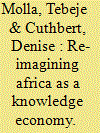

|
|
|
|
|
| Summary/Abstract |
Africa is being re-imagined as a knowledge economy, and higher education (HE) systems have been propelled into the centre of national economic plans and strategies. This paper provides an analysis of four recent major initiatives directed to the revitalisation of HE in sub-Saharan Africa: the Pan African University (2010), the Africa Higher Education Centers of Excellence Project (2014), The Kigali Communiqué on Higher Education for Science, Technology and Innovation (2014), and the Dakar Declaration and Action Plan on Revitalising Higher Education for Africa’s Future (2015). Guided by critical frame analysis, we examined assumptions and expectations of these regionally/globally structured HE development agendas. The findings show that, while there is a convergence of thinking on the promise for economic transformation held by invigorated HE sectors in Africa, there are uncritically adopted premises about how this transformation is to be achieved. In particular, we find that the promise held out for economic transformation through HE is at risk of failing through the inadequate contextualisation of global policy orthodoxies to African conditions, and that some of the premises about the nature and scale of the economic transformation required to make the re-imagined Africa a reality need to be reconsidered.
|
|
|
|
|
|
|
|
|
|
|
|
|
|
|
|
| 9 |
ID:
157781
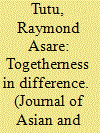

|
|
|
|
|
| Summary/Abstract |
This paper assesses the relative effects of acculturation preferences (assimilation, separation, integration, and marginalization) on migrants’ perception of acceptability in James Town, a traditional urban neighborhood in Accra, Ghana. There is a paucity of academic work on the relationship between migrants’ acculturation inclinations and their assessment of the hosts’ attitude towards them in Ghana. Cognizant of the fluidity of acculturation strategies, the study focuses on individual inclinations towards acculturation. To examine migrants’ perception of acceptability by the host, we use perceived personal discrimination. We utilize results from a semi-structured questionnaire administered to 301 migrant individuals from different migrant households in James Town. Our findings suggest that migrants with assimilation preferences are less likely to have a higher rating on the extent to which they are discriminated against by the host population. Such an exploratory study is pertinent to understanding relationships (conflicts or “togetherness in difference”) in poor multi-ethnic settings.
|
|
|
|
|
|
|
|
|
|
|
|
|
|
|
|
| 10 |
ID:
157774
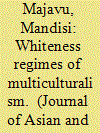

|
|
|
|
|
| Summary/Abstract |
This article uses a newly developed theoretical concept – the ‘uncommodified blackness’ image, to accentuate the discursive methods in which the humanness of Africans is denied in subtle and commonplace ways in Australia. In other words, the concept of uncommodified blackness is used in this study to theorise both the racist infrahumanisation and the blatant racist dehumanisation that Africans are subjected to in Australia. An analysis of semi-structured interviews with 11 research participants suggests that, through the image of uncommodified blackness, the participants are viewed by mainstream Australia as dysfunctional and dirty Others who ought to be avoided in public transport. Participants’ lived experiences imply that mainstream Australia regards them as outsiders and perpetual refugees who are failing at ‘integration’.
|
|
|
|
|
|
|
|
|
|
|
|
|
|
|
|
|
|
|
|
|